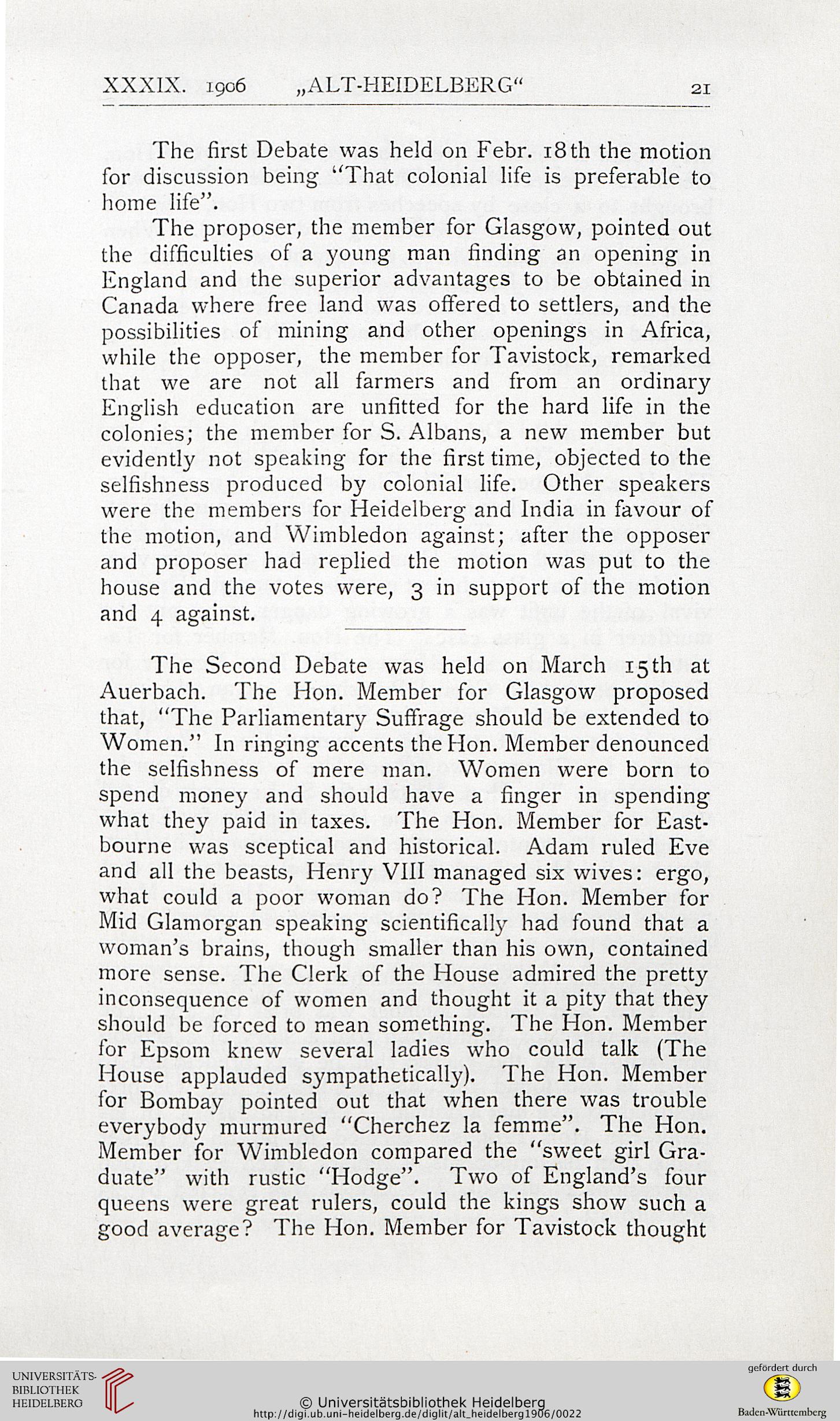XXXIX. 1906 „ALT-HEIDELBERG"
21
The first Debate was held on Febr. 18 th the motion
for discussion being "That colonial life is preferable to
home life".
The proposer, the member for Glasgow, pointed out
the difficulties of a young man finding an opening in
England and the superior advantages to be obtained in
Canada where free land was offered to settlers, and the
possibilities of mining and other openings in Africa,
while the opposer, the member for Tavistock, remarked
that we are not all farmers and from an ordinary
English education are unfitted for the hard life in the
colonies; the member for S. Albans, a new member but
evidently not speaking for the first time, objected to the
selfishness produced by colonial life. Other speakers
were the members for Heidelberg and India in favour of
the motion, and Wimbledon against; after the opposer
and proposer had replied the motion was put to the
house and the votes were, 3 in support of the motion
and 4 against.
The Second Debate was held on March 15 th at
Auerbach. The Hon. Member for Glasgow proposed
that, "The Parliamentary Suffrage should be extended to
Women." In ringing accents the Hon. Member denounced
the selfishness of mere man. Women were born to
spend money and should have a finger in spending
what they paid in taxes. The Hon. Member for East-
bourne was sceptical and historical. Adam ruled Eve
and all the beasts, Henry VIII managed six wives: ergo,
what could a poor woman do? The Hon. Member for
Mid Glamorgan speaking scientifically had found that a
woman's brains, though smaller than his own, contained
more sense. The Clerk of the House admired the pretty
inconsequence of women and thought it a pity that they
should be forced to mean something. The Hon. Member
for Epsom knew several ladies who could talk (The
House applauded sympathetically). The Hon. Member
for Bombay pointed out that when there was trouble
everybody murmured "Cherchez la femme". The Hon.
Member for Wimbledon compared the "sweet girl Gra-
duate" with rustic "Hodge". Two of England's four
queens were great rulers, could the kings show such a
good average? The Hon. Member for Tavistock thought
21
The first Debate was held on Febr. 18 th the motion
for discussion being "That colonial life is preferable to
home life".
The proposer, the member for Glasgow, pointed out
the difficulties of a young man finding an opening in
England and the superior advantages to be obtained in
Canada where free land was offered to settlers, and the
possibilities of mining and other openings in Africa,
while the opposer, the member for Tavistock, remarked
that we are not all farmers and from an ordinary
English education are unfitted for the hard life in the
colonies; the member for S. Albans, a new member but
evidently not speaking for the first time, objected to the
selfishness produced by colonial life. Other speakers
were the members for Heidelberg and India in favour of
the motion, and Wimbledon against; after the opposer
and proposer had replied the motion was put to the
house and the votes were, 3 in support of the motion
and 4 against.
The Second Debate was held on March 15 th at
Auerbach. The Hon. Member for Glasgow proposed
that, "The Parliamentary Suffrage should be extended to
Women." In ringing accents the Hon. Member denounced
the selfishness of mere man. Women were born to
spend money and should have a finger in spending
what they paid in taxes. The Hon. Member for East-
bourne was sceptical and historical. Adam ruled Eve
and all the beasts, Henry VIII managed six wives: ergo,
what could a poor woman do? The Hon. Member for
Mid Glamorgan speaking scientifically had found that a
woman's brains, though smaller than his own, contained
more sense. The Clerk of the House admired the pretty
inconsequence of women and thought it a pity that they
should be forced to mean something. The Hon. Member
for Epsom knew several ladies who could talk (The
House applauded sympathetically). The Hon. Member
for Bombay pointed out that when there was trouble
everybody murmured "Cherchez la femme". The Hon.
Member for Wimbledon compared the "sweet girl Gra-
duate" with rustic "Hodge". Two of England's four
queens were great rulers, could the kings show such a
good average? The Hon. Member for Tavistock thought





